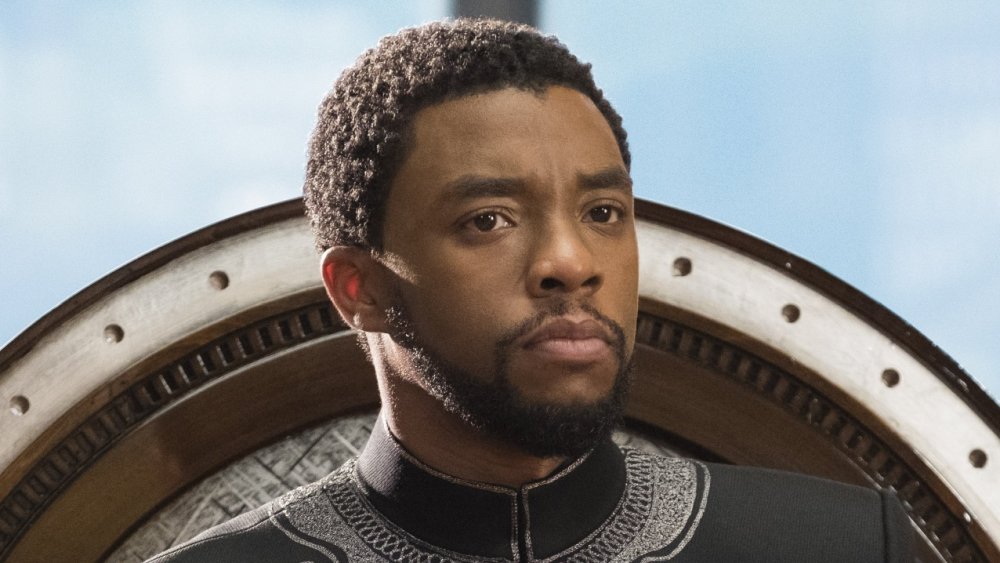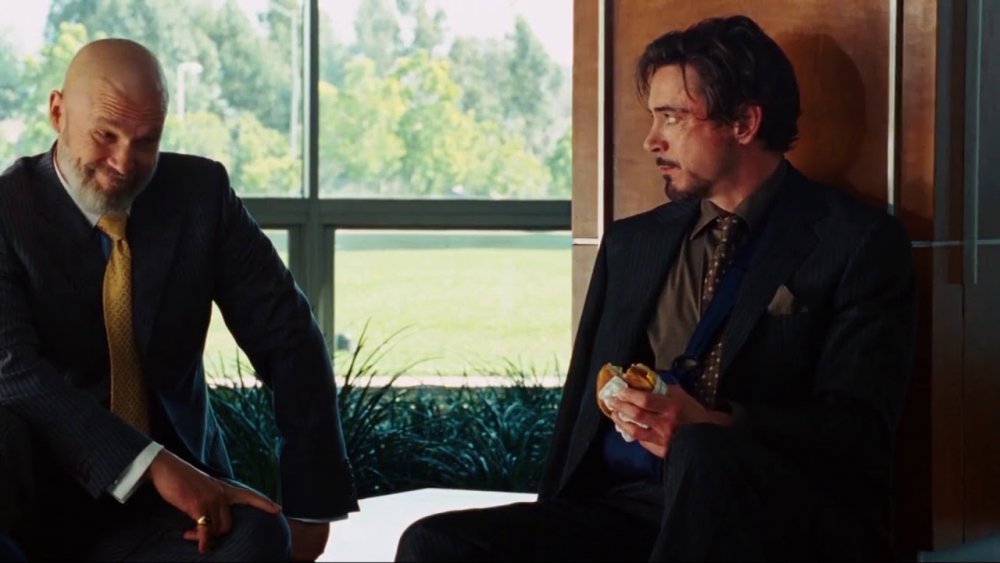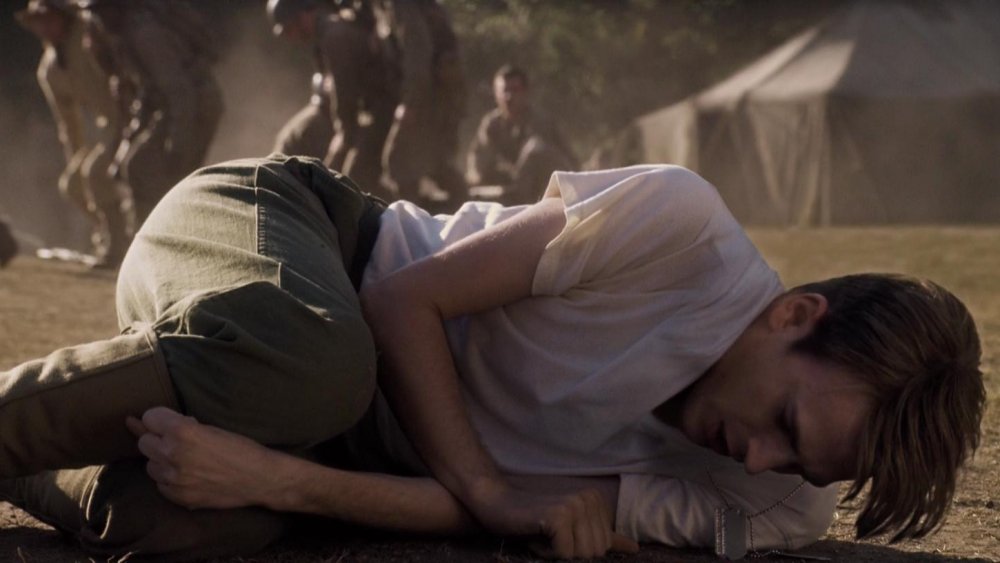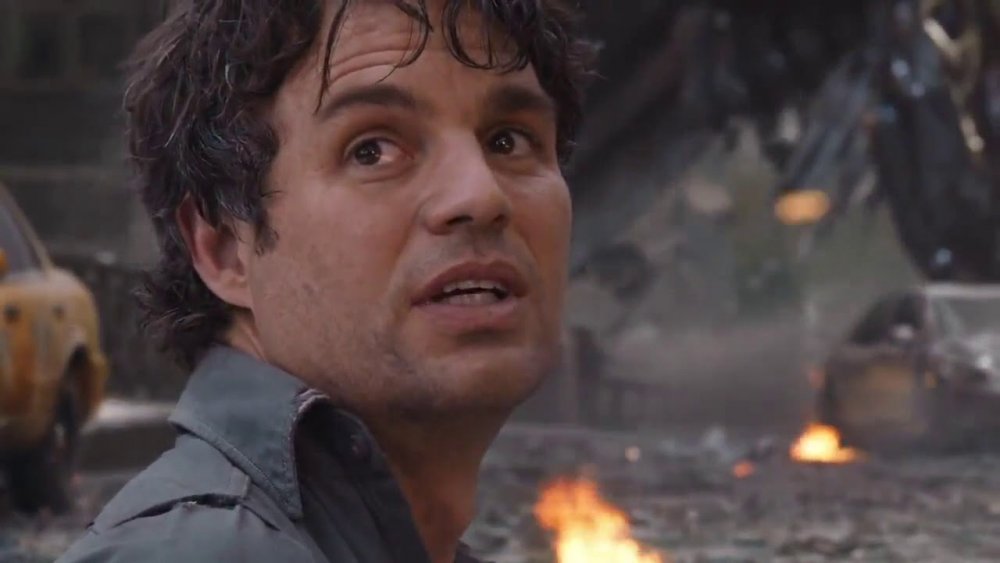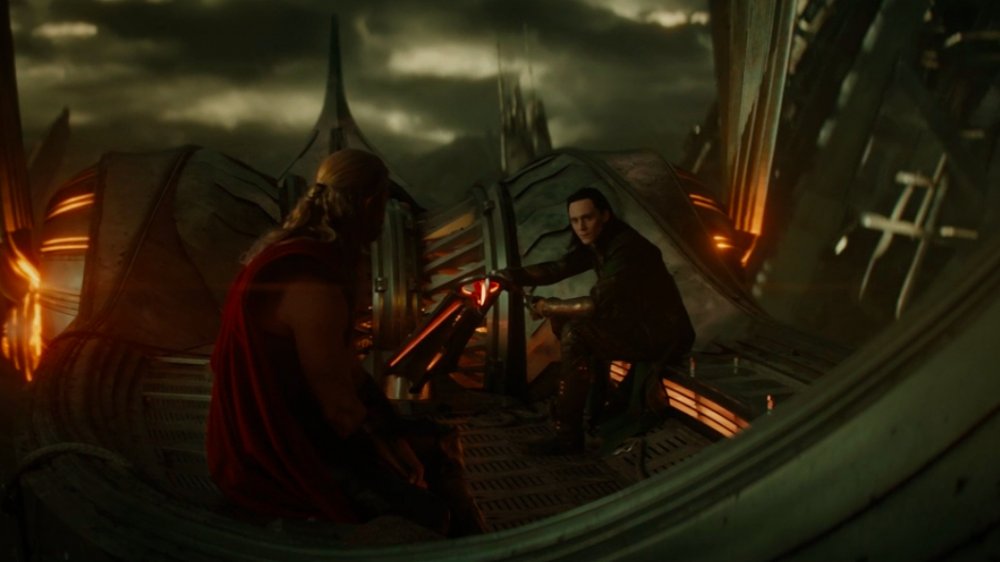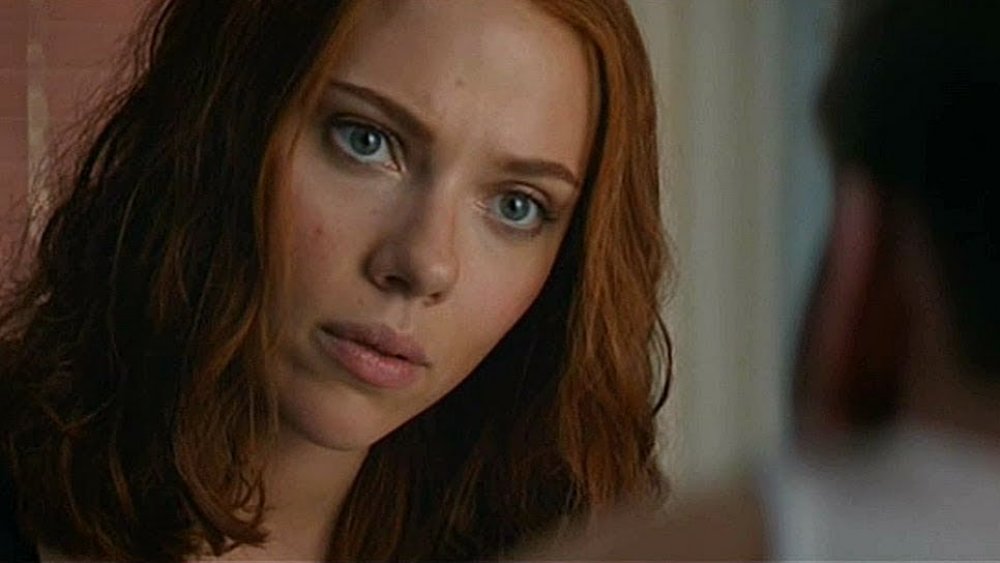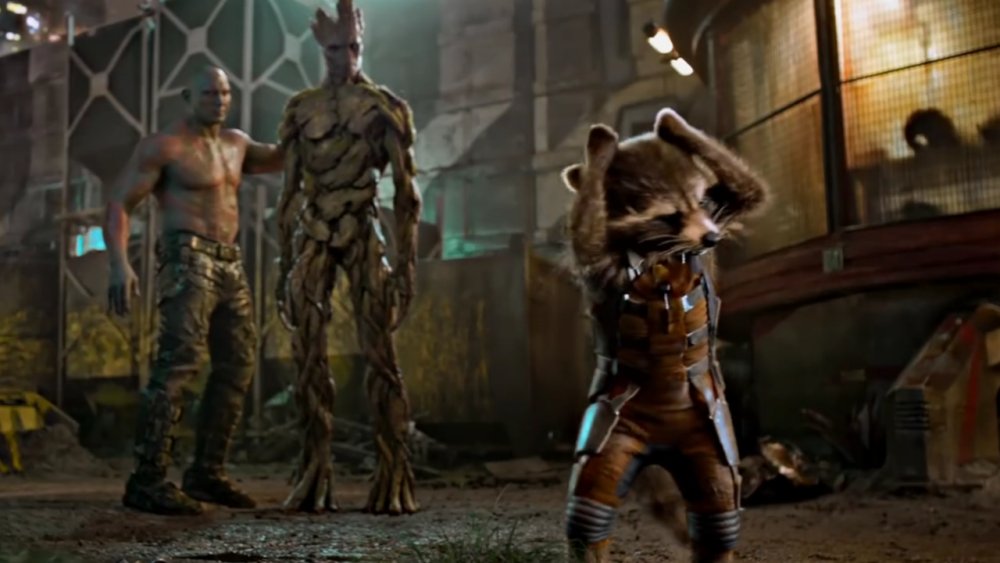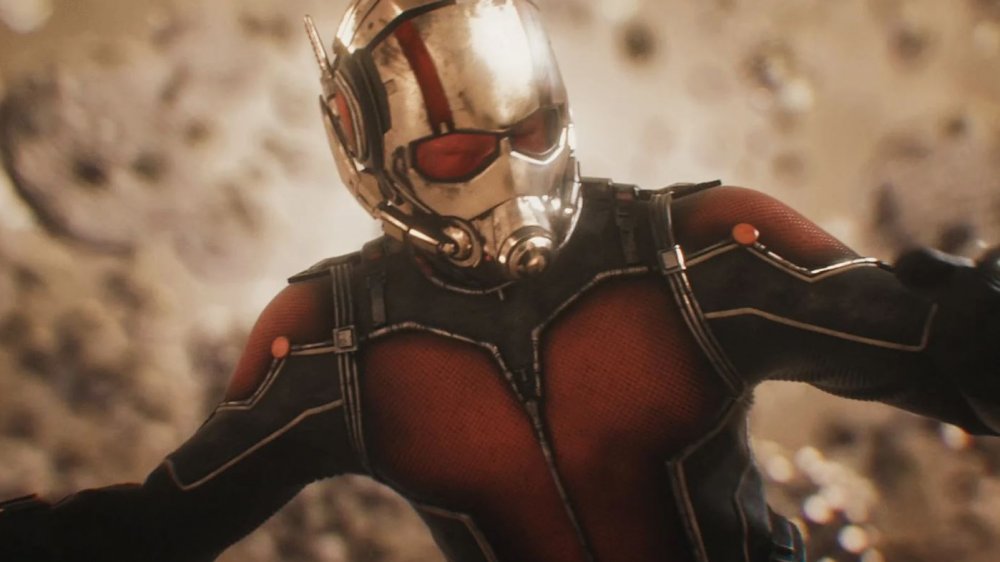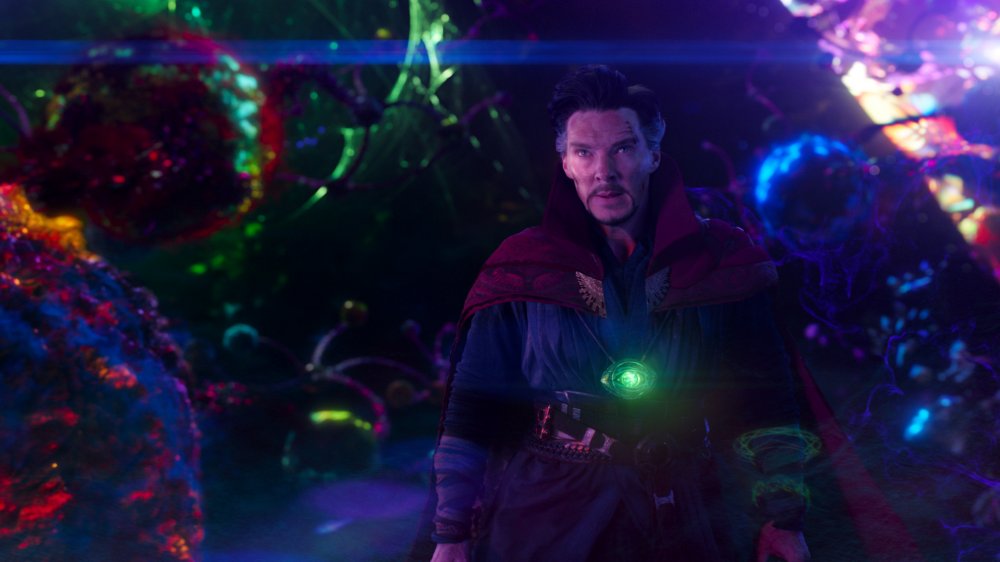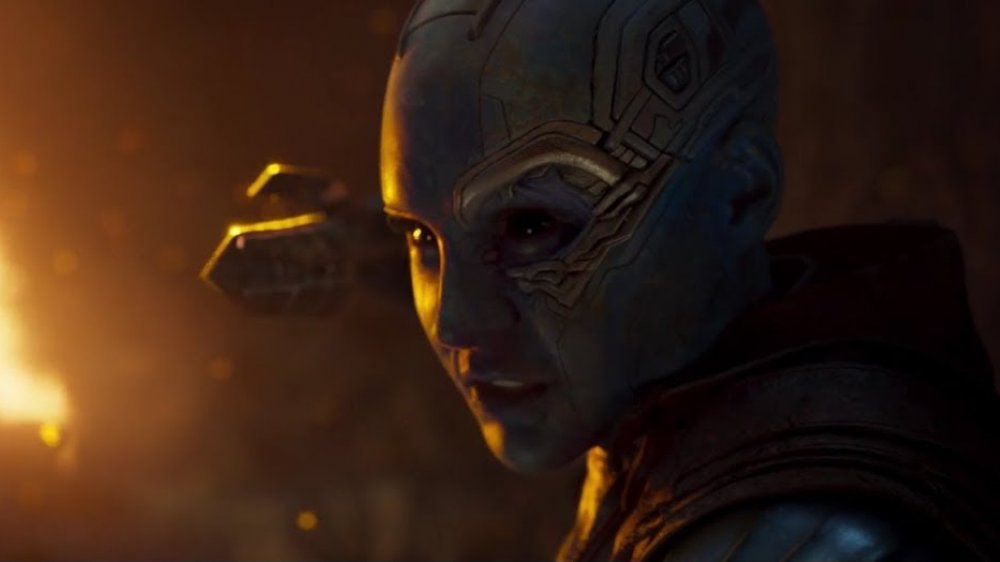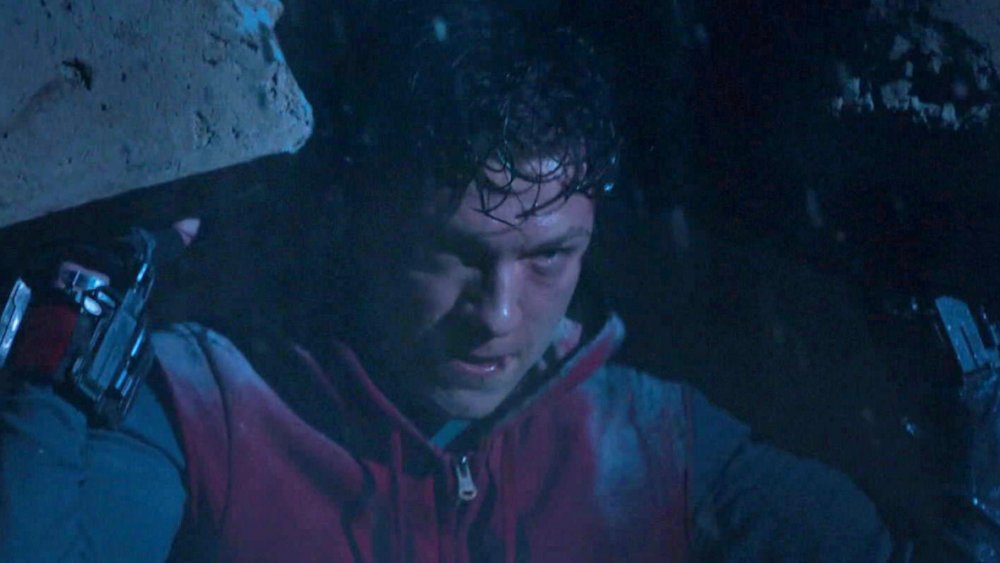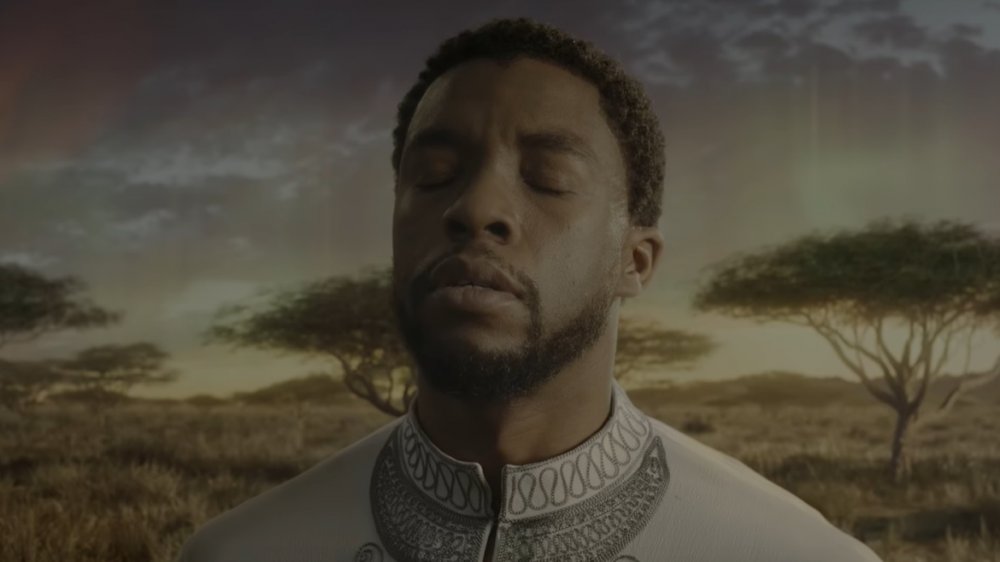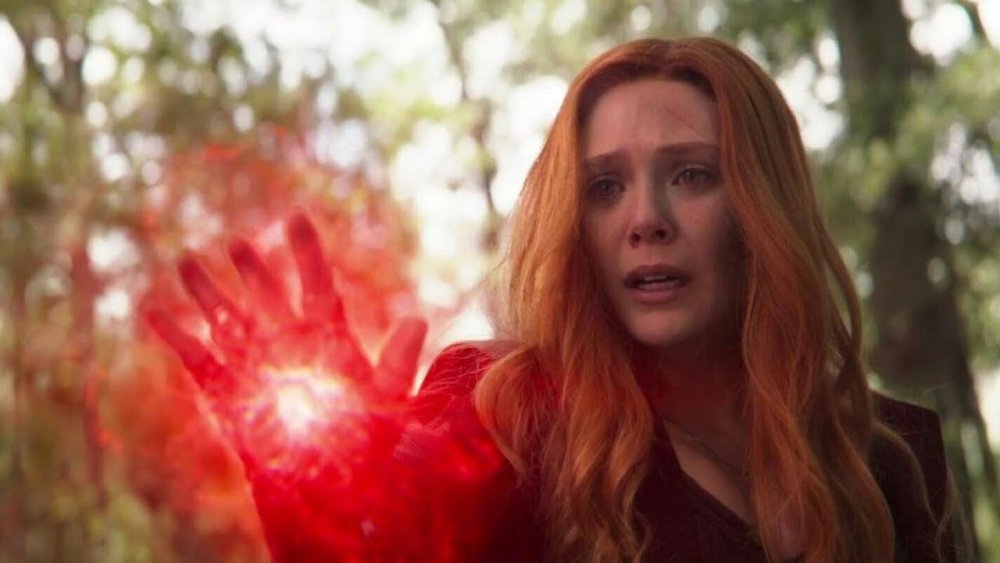Most Character-Defining Moments In The MCU
A certain masked superhero once said in reference to his alter ego, "It's not who I am underneath, but what I do that defines me." However, when it comes to the characters of the Marvel Cinematic Universe, the exact opposite may be true. While the heroes of the MCU all boast intimidating skill sets, and it's easy to name multiple scenes for any given character in which they showcase their impressive powers in an explosive way, it's often in the quieter moments where we really get to know them. With a sprawling cast of characters spread out over more than a decade's worth of films, the MCU has worked hard to give its audience a sense of not only what its characters can do, but who they are apart from their abilities.
These are the conversations, confrontations, and moments of introspection that help establish who these characters are on the inside, without their extraordinary abilities, so that we always understand what drives and defines them going forward. Below, we've rounded up some of the most character-defining moments in the MCU, from the subtle to the spectacular, that help give us a glimpse behind the curtain of Earth's Mightiest Heroes, and clue us in on exactly what makes them tick.
Tony Stark stops making weapons
After witnessing firsthand the catastrophic impact his products can have, Tony Stark (Robert Downey Jr.) impulsively decides in 2008's Iron Man that Stark Industries will stop manufacturing weapons, giving no mind to the money he'll lose. He announces his decision with zero warning at a press conference following his captivity in Afghanistan, throwing his company's manager, Obadiah Stane (Jeff Bridges), for a major loop. But Tony, happily scarfing down a cheeseburger, doesn't really care about his decision's impact on profit and loss statements or how disgruntled he makes his investors. All that concerns him is that his conscience is clear, and that he's using his vast resources for something he can believe in.
By this point in Iron Man, we'd already gotten a clear picture of Tony's immaturity and narcissism, as well as his ingenuity, determination, and bravery when he creates his first Mark 1 suit while he's supposed to be building a missile for terrorists. But it's not until this scene that we truly see his impulsivity and idealism on full display, along with the reckless selflessness and weighty sense of responsibility that will go on to define Tony's tenure as Iron Man far more than any of his mechanical suits. Ultimately, Tony's firm belief that it's up to him to make the world a better place, no matter the personal cost, is what will drive him to rejoin the Avengers after the snap, defeat Thanos, and die saving the world.
Steve Rogers throws himself on a grenade
Probably the most memorable line from Captain America: The First Avenger is Steve Rogers' (Chris Evans) plucky, oft-repeated, "I can do this all day," which becomes a sort of mantra for him in the MCU, a defiant challenge he throws in the faces of his enemies when they think they've got him right where they want him. But there's another moment from Steve's first film that may be an even better illustration of the first Avenger's core personality, and like that classic line, it happens before he has any superpowers at all.
Throughout Steve's time in basic training, he's demeaned by his fellow recruits, and he becomes an easy target for bullying. But when a grenade is thrown into a group that includes Rogers and his peers, Steve dashes toward the explosive while everyone else flees for their lives, curling his body around the grenade in order to shield the others from the blast. Although the grenade turns out to be a dummy, Steve's willingness to lay down his life without hesitation in order to save people who don't even like him is such a strong indicator of his selfless and exceedingly moral character that it prompts Colonel Phillips (Tommy Lee Jones) to finally approve him as a candidate for the super-soldier program.
Interestingly enough, there's only one other character who runs toward the grenade in this scene, and that's Peggy Carter (Hayley Atwell), establishing herself early on as Steve's true match. It's only fitting that when Steve finally exits the MCU, it's to be with her.
Bruce Banner is always angry
After nearly destroying the helicarrier as the Hulk in The Avengers, Bruce Banner (Mark Ruffalo) plummets out of the sky and crashes into the earth, and when he resumes his human form, he's horrified at what he's done. Hulking out and attacking the wrong people has long been one of Bruce's biggest fears, and it was one of the main reasons why he was reluctant to join the Avengers in the first place. Once he realizes he lost control and nearly killed all of his allies, he's understandably tempted to stay away from the conflict, where he's sure not to hurt anyone.
Yet when the Chitauri begin to swarm through the streets of New York, Banner returns, rejoining the team at a crucial point in the battle. When Steve suggests that now might be a good time to get angry and thus trigger his transformation into the Hulk, Banner utters his famous line, "I'm always angry," before turning green and punching out a Leviathan. Not only does this scene perfectly illustrate the inner struggle constantly churning inside of Bruce, making it clear just how difficult it is for him to keep the Hulk at bay, but it also shows his determination to do what's right, even at his own peril.
Thor and Loki's ancient sibling rivalry
Thor: The Dark World is one of the most (and perhaps unjustly) maligned movies in the MCU, but despite its flaws, it may contain the best exploration of the inner workings of the sons of Odin, Thor (Chris Hemsworth) and Loki (Tom Hiddleston). The gods of thunder and mischief have constantly butted heads since the first Thor film, but in The Dark World, we witness a rare moment of emotional honesty and vulnerability as they grieve their mother's death.
At first, the scene seems to be little more than yet another argument between the brothers, as Loki covets the power within Jane Foster (Natalie Portman). They quickly turn to blaming one another for Frigga's (Rene Russo) death, each trying to prove that he was the better son. But then Thor stops attacking, determined to act in a way the mother they both loved would've wanted, which Loki counters by saying that although she may not want them to fight, she wouldn't be surprised. Thor gives Loki a rueful smile, saying, "I wish I could trust you."
Loki then gives one of his few non-sarcastic responses in the MCU, as he tells his brother, "Trust my rage." This is the brothers in a nutshell, with Thor always striving to be more worthy, and Loki always motivated by his anger that he never will be. And underneath it all, there's the knowledge that they love each other and yearn for the close relationship they once had, even if they doubt they'll ever regain it.
Natasha Romanoff's most powerful MCU moment
Natasha Romanoff, aka Black Widow (Scarlett Johansson), has always been a bit of an enigma in the MCU, and not only because it's taken four phases for the franchise to finally get around to giving her a solo movie. First introduced in Iron Man 2, Natasha has reinvented herself with every MCU film, using her training to morph into whatever role she needs to fill. Throughout it all, we've gotten glimpses of the real Natasha here and there, most notably through her friendship with Clint Barton (Jeremy Renner) and his family, and the times she's talked about her past as a Russian spy.
However, during a scene in Captain America: The Winter Soldier, Natasha gives us an honest look at who she is underneath all the layers of mystery. Visibly shaken after learning that S.H.I.E.L.D., the organization she turned to after leaving the KGB, was compromised by HYDRA, Natasha voices her concern to Steve that she'll never be able to fully switch sides. She then asks Steve if he'd trust her to save his life, nervous that she'll never be good enough, and is relieved when he says yes. It's a rare moment of vulnerability from the notoriously guarded super spy, in which she admits her fears about the work she does, along with her desire to be the kind of person that others rely on — a goal she ultimately achieves when she sacrifices herself for the Soul Stone in order to save her friends.
Rocket Raccoon shows his character by beating up grass
One of the lowest points in Guardians of the Galaxy comes when Drax (Dave Bautista) attempts to seek revenge on Ronan (Lee Pace) for the murder of his family and nearly gets himself killed, along with the rest of the Guardians. After Groot revives Drax, Rocket (Bradley Cooper) joins them, livid that Drax's actions put them all in jeopardy and determined to take Groot and flee to the opposite end of the universe before Ronan can use the Power Stone to wreak massive destruction. Rocket refuses to be swayed by Drax's loss of his family, saying that "everybody's got dead people" and doubling down on his every-man-for-himself philosophy.
However, when Groot points out that the Guardians are the only friends they've ever had, Rocket reluctantly agrees to go against his own self-interest to try to save them, but he also makes it clear that he's incredibly angry that he now cares about people besides himself and Groot, kicking the grass in frustration. Throughout the first half of Guardians of the Galaxy, Rocket is portrayed as someone who's been hurt and cast aside by society, and who's coped with the abuse and rejection by shutting himself off to the rest of the world. But here, in deciding to risk his life to save his friends, we see how — against his better judgment — Rocket really does yearn for connection and community, and that while his morality and heroism may be buried deep down inside him, they're definitely there.
Scott Lang goes subatomic
Although by the end of Endgame, the Avengers are popping in and out of the Quantum Realm like it's a high-tech subway car, Scott Lang (Paul Rudd) spends most of the first Ant-Man convinced of the horrific dangers of going subatomic. Hank Pym (Michael Douglas) warns Scott that if he were to enter the Quantum Realm, his concept of time and space would become irrelevant, adding that "everything that you know and love" would be "gone forever."
Yet at the end of the film, that's precisely what Scott does in order to save his daughter, along with his ex-wife's boyfriend, Jim (Bobby Cannavale). By shrinking down between the molecules of Darren Cross' (Corey Stoll) Yellowjacket suit, Scott is able to cause the suit to implode and thus save the day, but he then tumbles into the Quantum Realm, untethered from our reality. However, it isn't long before his love for his daughter anchors him to the outside world and enables him to return.
We kinda knew that Scott would have to go subatomic by the end of the film, after being warned against it so many times, but his reason for doing so did a lot to show us who he is. He didn't even like Jim, but Scott knew he would protect Cassie, and he was willing to sacrifice himself to save them both. His love for his daughter was enough to not only send him into the Quantum Realm, but also, against all odds, to bring him back.
Stephen Strange comes to bargain
At the beginning of Doctor Strange, Stephen Strange (Benedict Cumberbatch) isn't a particularly likable character. Haughty and egotistical, he doesn't seem like the kind of person you'd ever picture as a hero, and even when he seeks out the Ancient One (Tilda Swinton) and begins to learn the mystic arts, it's entirely self-serving. Gradually, over the course of the film, he becomes more sympathetic, but it's not until the end of the film and his showdown with Dormammu, the all-powerful ruler of the Dark Dimension, that we finally see who Strange is underneath his polished, pompous exterior.
After realizing he can't defeat Kaecilius (Mads Mikkelsen) in our reality as long as he's drawing power from the Dark Dimension, Strange locks himself and Dormammu in an eternal time loop, knowing he can't win against the immortal entity but determined to lose over and over indefinitely until they reach a stalemate, thus sparing the people of Earth in the meantime. Dormammu kills Strange repeatedly, only to have the loop reset and Strange appear before him once again. In Strange's ever-cycling confrontation with Dormammu, we not only see his intellectual approach to conflict, but we also witness his willingness to embrace calculated — and defiantly optimistic — self-sacrifice and to lean into the long game. We eventually see him do something similar at the end of Infinity War, when he voluntarily gives up the Time Stone, knowing it will result in his death, on the sliver of a chance that it might eventually lead to victory.
Nebula just wanted a sister
After being cast as a villain in the first Guardians movie, things come to a head between Nebula (Karen Gillan) and her adopted sister, Gamora (Zoe Saldana), in Guardians of the Galaxy Vol. 2. The daughters of Thanos have always been at each other's throats, but their feud goes far beyond typical sibling rivalry. Vol. 2 reveals that when the sisters were children, Thanos would have them battle one another, and that every time Gamora would win — which was every time — Thanos would replace a piece of Nebula with machinery, claiming he wanted to make her Gamora's equal.
Given her horrific childhood, it's understandable why Nebula spends all of the first Guardians film and the first half of the second determined to kill Gamora and finally win their father's approval. However, in Vol 2., we see that Nebula's pain goes far deeper than simple envy after she first tries to murder Gamora, then is nearly killed by her sister before being saved by her, and then ultimately sparing Gamora's life when she has the opportunity to finish her off. Gamora accuses her of being obsessed with winning, but Nebula reveals that the reason she's so resentful is because throughout their lives, while Gamora tried to win, Nebula just wanted a sister. It turns out that every awful thing she's done has been in service of her simple desire to have a family that loves her. And eventually, in the Guardians and the Avengers, that's exactly what she finds.
Peter Parker lifts a building
Although the MCU skipped right over Peter Parker's (Tom Holland) origin story, introducing him in Captain America: Civil War after he'd already gotten his powers and had started swinging around New York City, Spider-Man: Homecoming gives us a good look at the kind of person Peter is underneath his Stark-tech suit. Throughout Homecoming, we see Peter try to balance high school and the normal, everyday concerns of a teenage boy with the high-stakes responsibilities of being a superhero. However, the consequences of his teenage impulsivity and recklessness lead Tony to believe that Peter is in way over his head, and he takes away his high-tech Spider-suit, telling the kid that if he's nothing without the suit, then he shouldn't have it.
Yet Peter's strong sense of duty won't allow him to remain on the sidelines, even without a suit, so he goes after the Vulture (Michael Keaton) in his original Spider-sweats, only to get a building dropped on him. Left for dead under the rubble, at first, Peter panics, crying for help in a heartbreaking display that makes it clear that underneath all the superpowers, he's still just a scared kid. But then, realizing no help is coming, Peter looks inward, remembering Tony's words and resolving to be Spider-Man with or without the suit. Using every bit of his enhanced Spider-strength, Peter saves himself, showing himself to be determined, resourceful, and confident, no matter the circumstances.
T'Challa's big MCU moment comes in the afterlife
T'Challa (Chadwick Boseman) spends much of Captain America: Civil War and Black Panther living in his father's shadow and trying to be the son and ruler he believes King T'Chaka (John Kani) expected him to be. He supports his father's legislation, keeps his policies in place once T'Chaka is gone, and becomes consumed with avenging his death. However, after learning the truth of how his father orphaned Killmonger (Michael B. Jordan) as a child and abandoned him, he finally searches his own heart for what he believes and discovers he disagrees with his father's approach to ruling.
In the final act of Black Panther, after T'Challa has had his powers stripped away and his throne usurped, he receives the heart-shaped herb for a second time and ascends to the Ancestral Plane, where he encounters the spirit of his father. This time, T'Challa is finally is able to admit that he thinks T'Chaka was wrong. He now understands that the decision to keep Wakanda secret was based in fear, and he resolves that he will be a king who leads not by fear, but by doing what is right. After he regains the throne, we see T'Challa remain true to his new understanding of himself as he begins to use Wakanda's vast resources to help the disadvantaged in the outside world, and then again in Infinity War and Endgame when he offers Wakandan technology to help the Avengers and uses the armies of Wakanda to lead the charge against Thanos.
Wanda Maximoff destroys the Mind Stone
Although Wanda Maximoff (Elizabeth Olsen) has only ever been a supporting character in the MCU, she's still managed to become one of its most intriguing and complex characters. First introduced as a villain in Avengers: Age of Ultron, she switched sides when she realized the devastating potential of Ultron's plan, and she was instrumental in defeating Ultron's army of robots when she unleashed a tremendous burst of energy after her twin brother, Pietro (Aaron Taylor-Johnson), was killed. Since then, Wanda has shown herself to be a strong ally to the Avengers and a force to be reckoned with, but it wasn't until Infinity War that we truly got an idea of not only who she is, but what she's capable of.
After spending most of the film insisting that she's not willing to sacrifice Vision (Paul Bettany) — with whom she had a mostly off-screen romance — to protect the Mind Stone from Thanos (Josh Brolin), Wanda is forced to change her tune by the end. Once the rest of the Avengers fall, Wanda realizes she's the only one left to stop Thanos, and she destroys the Mind Stone, killing Vision in the process as tears stream down her face. At the same time, she holds Thanos off one-handed — an impressive feat after seeing Thanos swat down the rest of the Avengers like flies. Not only does this scene demonstrate that Wanda is astonishingly powerful, but it also shows that she's brave and determined to do what's right, even if it goes against what she wants for herself, all characteristics we expect will be on full display in her eagerly anticipated Disney+ series, WandaVision.
